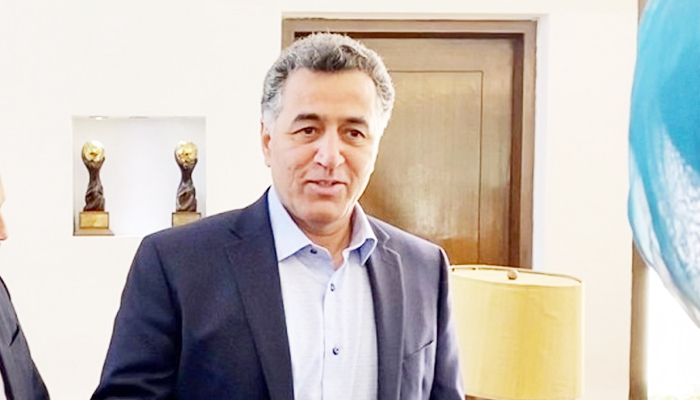Ex-spy chief Faiz Hamid says talks with TLP held on 'govt’s orders'
Former spymaster was summoned by panel — investigating 2017 TLP sit-in — thrice but failed to appear before it
ISLAMABAD: Responding to the Faizabad sit-in commission’s questions, former spicy chief Lt Gen (retd) Faiz Hamid categorically denied allegations of conspiring against the then-government, sources told Geo News Thursday.
The former spymaster was summoned by the panel — investigating the 2017 sit-in staged by the Tehreek-e-Labbaik Pakistan (TLP) — thrice but he failed to appear before it.
He was then sent a questionnaire by the commission to which he responded and stated that he held negotiations with the TLP on the directions of the government.
According to the sources, the commission had summoned the former army officer on January 2 (Tuesday) but he didn't appear before the panel.
This was the third time that the former ISI chief remained absent from the hearing being conducted by the inquiry commission, which earlier summoned him in the second week of December last year and then on December 29, sources said. However, the first notice couldn’t be delivered.
In November last year, the caretaker federal government constituted the inquiry commission for the implementation of the Supreme Court's 2019 Faizabad verdict.
The probe panel was constituted on the orders of the Supreme Court of Pakistan under the chair of retired IGP Akhtar Ali Shah after the apex court rejected the fact-finding committee report constituted by the government.
On November 15, Chief Justice Qazi Faez Isa remarked that the commission would be empowered to summon anyone, including former army chiefs, prime ministers, and chief justices.
The inquiry commission is required to submit its report to the top court on January 22.
The probe panel had also summoned Pakistan Muslim League-Nawaz (PML-N) President and former prime minister Shehbaz Sharif on January 3 but he too didn't appear and requested the commission to send him questions.
He has now been sent a 21-point questionnaire to answer.
Earlier, former prime minister Shahid Khaqan Abbasi, ex-interior minister Ahsan Iqbal, then-secretary to PM Fawad Hasan Fawad, and other senior officials serving in Islamabad and Punjab who were involved in the episode had appeared before the probe panel.
Faizabad verdict
In November 2017, the top court took suo motu notice of the three-week-long sit-in, which was held against a change in the finality-of-Prophethood oath, termed by the government as a clerical error, when the government passed the Elections Act 2017.
The sit-in was called off after the protesters reached an agreement with the government.
On February 6, 2019, a two-member bench of the apex court comprising the now-CJP Isa and Justice Mushir Alam recommended that persons, issuing an edict or fatwa to harm another person or put another person in the harm’s way must be dealt with iron hand and prosecuted under relevant laws.
It also ruled that the intelligence agencies must not exceed their respective mandates. Later, the bench disposed of a suo moto case regarding the 2017 Faizabad sit-in staged by the TLP.
The 43-page verdict issued by the two-judge bench and published on the apex court's website read: “Every citizen and political party has the right to assemble and protest provided such assembly and protest is peaceful and complies with the law imposing reasonable restrictions in the interest of public order.
“The right to assemble and protest is circumscribed only to the extent that it infringes on the fundamental rights of others, including their right to free movement and to hold and enjoy property.”
-
Security forces gun down 30 terrorists in multiple IBOs in KP: ISPR
-
MQM-P calls for new province in Sindh
-
US report validates Pakistan military edge over India: PM
-
Banned TTP poses serious threat to Pakistan security: UNSC panel
-
CM Afridi clarifies remarks on by-poll after ECP requests army deployment
-
Dubai sees 3.2m Pakistani passengers in 2025 as airport sets new milestone
-
Security forces kill 23 Indian proxy terrorists in KP's Kurram
-
Pakistan to construct island to boost oil exploration: report












